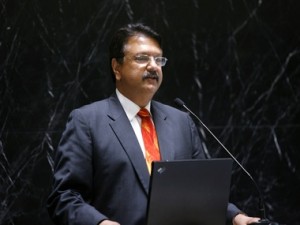For some time now, Ajay Piramal has been working on a plan to convert his Rs 5,000 crore group from a pharma-centric player to a much more diversified conglomerate. His latest move of investing close to Rs 6,000 crore in Vodafone India must be viewed in that context.
In fact, Piramal has been underscoring the move to turn into a conglomerate pretty strongly of late. At the recent Wharton India Economic Forum, he made it clear that a diversified conglomerate wasn’t necessarily a bad idea, since it made getting into new businesses easier, since the power of an existing brand and business could be leveraged to garner funds for a new business.
In fact, the Vodafone deal, where Piramal bought a total of 11 per cent in the Indian arm of the telecom major in two tranches - the second and final instalment being completed last week for Rs 3,007 crore, a slightly higher price than what he paid for an equal amount last year - demonstrates Piramal’s resolve not only to diversify his risks, but also to maximise returns in the process.
[caption id=“attachment_207169” align=“alignleft” width=“300” caption=“For some time now, Ajay Piramal has been working on a plan to convert his Rs 5,000 crore group from a pharma-centric player to a much more diversified conglomerate. AFP”]
 [/caption]
[/caption]
While some sections of investors may balk at unrelated investments by companies, Piramal’s plan clearly is to benefit from diversification. An industrialist who, by his own admission, relies on his gut and doesn’t believe in consulting ’experts’ too much before making key decisions, Piramal’s latest foray into the unrelated business of mobile telephony - albeit as a minor partner - is clearly aimed at generating handsome returns in the short run.
In an interview with Business Standard, Piramal explains his twin philosophy: that of transforming his group from a pharma-centric one to a diversified one, and the fact that he is aiming for a 17-20 per cent return and plans to exit Vodafone in 12-18 months.
Impact Shorts
More Shorts“The move is perfectly timed,” reasons Sudhir Dash, CEO of UK-based asset manager Investec. “Following the favourable tax ruling which Vodafone has got, and the fact that there will be auctions for 2G spectrum soon, an existing player with a large subscriber base like Vodafone is in a good position. It’s a good investment from that standpoint.”
A fellow industrialist concurs: “It seems to be a smart financing move. He will generate good returns, and must have weighed all the risks carefully.”
In fact, the deal is a win-win for Piramal, who is also drawing up big plans for forays into financial services and homeland security. The February issue of Entrepreneur magazine, which is also owned by Network18 which publishes Firstpost, also details his gameplan in the area of drug discovery, which will be his biggest bet yet, and which he plans to achieve through smaller, global acquisitions.
If Piramal can generate the kind of returns he is expecting from the Vodafone deal in about 18 months, he would have had a good investment cushion for his future growth plans. That Piramal knows the timing of exiting a business has been amply proved by the staggering valuation he extracted from Abbott Laboratories of the US, when he sold Piramal Healthcare’s formulations business for a whopping $3.7 billion, or Rs 17,000 crore, in 2010.
“His timing even for exits has been good,” points out Dash.
On the telecom front, the low-cost telecom player model is now set to change, with the forthcoming 2G auctions. If the base price is high, as it is likely to be, then existing players like Vodafone, which command good ARPUs (average revenues per user), will stand to gain from an established brand and subscriber base. Besides, tariffs are also expected to rise in the coming days. “With a cream of subscribers, players like Vodafone will be well positioned to reap the benefits of the changing scenario.”
The high costs incurred by players in readying themselves for 3G will also compel them to go for faster rollouts now. This will also mean Vodafone, at some point, depending on market conditions, will have to go in for an IPO. Once that happens, Piramal has his exit made even easier.
Of course, valuations will be key. But even before that, as he himself says, he can always sell his stake back to Vodafone or to another buyer. In any eventuality, his exit is taken care of. Clearly, buying a stake in Vodafone after Essar’s exit is one of Ajay Piramal’s best move yet. After the Abbott sale, that is.
Sourav Majumdar has been a financial journalist for over 18 years. He has worked with leading business newspapers and covered the corporate sector and financial markets. He is based in Mumbai.
)